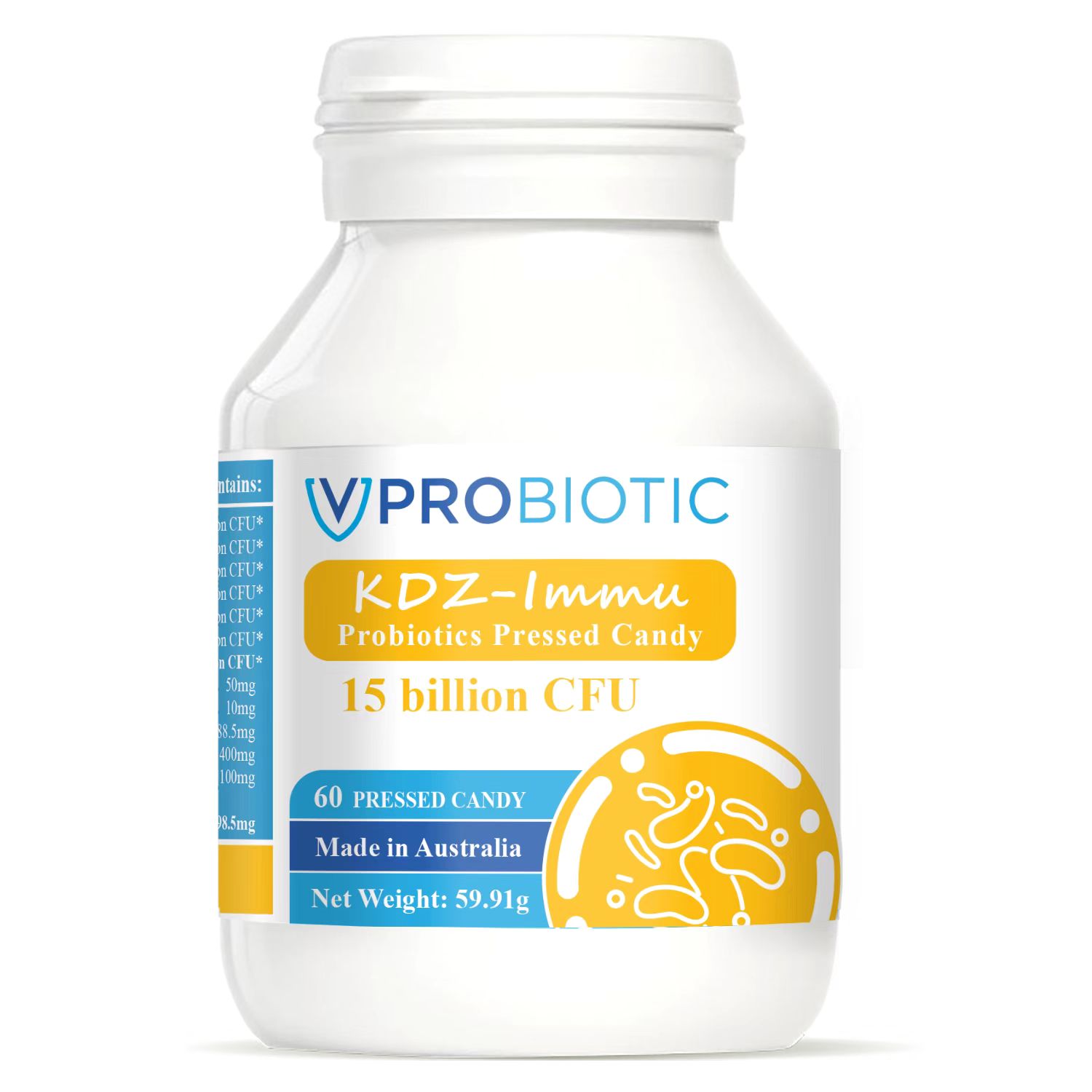
KDZ-IMMU PROBIOTICS
Chewable Tablets
30s/60s
KDZ-IMMU combines the benefits of a daily Multivitamin with the added benefits of Probiotics for digestive & immune system health – all in one delicious chewable tablet. It has been specially formulated with Vitamin D3, Vitamin C and IgG to give your child key nutrients needed to support healthy growth & development, cognitive function, bones, skin, gums, teeth and general health & wellbeing. Plus it has 6 strains of Probiotics added to support digestive & immune system health. KDZ-IMMU Chewable has been designed for kids so they will enjoy taking them. It is 99% sugar free with a delicious flavor.
INGREDIENTS
| Each candy contains: | |
| Lactobacillus acidophilus | 3 billion CFU* |
| Lactobacillus plantarum | 2 billion CFU* |
| Lactobacillus reuteri | 2 billion CFU* |
| Lactobacillus rhamnosus | 4 billion CFU* |
| Bifidobacterium infantis | 2 billion CFU* |
| Bifidobacterium lactis | 2 billion CFU* |
| Total | 15 billion CFU* |
| Acerola cherry fruit powder (contain: Vitamin C 10mg) | 50mg |
| Mushroom powder (contain: D3 200IU) | 10mg |
| Pumpkin powder (contain: Zinc 4mg) | 88.5mg |
| Bovine colostrum powder(contain: 20% IgG, 80IgG) | 400mg |
| Galacto-Oligosaccharides (Prebiotic) | 274mg |
| *CFU: Colony Forming Units |
HOW TO EAT:
It is recommended to consume 1 candy per day, eat directly.
WARNINGS:
Do not consume if the label seal around cap is broken
or removed.
STORAGE INSTRUCTIONS:
Store in a dry place away from direct sunlight. Keep out of reach
of children.
Pregnancy and breast-feeding: The product can be used during pregnancy and breast-feeding.

KEY BENEFITS
- One tablet consists of a minimum of 15 Billion CFU
- One table consists of 200IU vitamin D3
- One table consists of 4mg Zinc
- One table consists of 80IgG
- Help support immune function
- Promote digestive health
- Beneficial for the treatment of diarrhea, gastroenteritis, atopic eczema, and colic.
L. = Lactobacillus
Mostly found in such as the digestive system, urinary system, and genital system
B. = Bifidobacterium
Bifidobacteria are one of the major of bacteria that make up the gastrointestinal tract
S. = Streptococcus thermophilus
Streptococcus thermophilus is a type of probiotic (“good” bacteria) found in the digestive tract. It produces lactic acid in the gut.
CFU = Colony Forming Units
Unit of measurement used for probiotics and other bacteria.
KDZ-IMMU FAQS
Are chewable probiotics effective ?
Chewable probiotics are good for supporting oral and good health. However, their exposed nature is vulnerable to stomach acid. Make sure there are acid resistant probiotics in your chewable probiotic such as Lactobacillus, Bacillus, and Saccharomyces boulardii.
What are the side effects of chewable probiotics ?
Probiotics are safe for the majority of the population, but side effects can occur. The most common side effects are temporary increase in gas, bloating, constipation and thirst. Some people can also react poorly to ingredients used in probiotic supplements or to naturally occurring amines in probiotic foods.
How long does it take for probiotic chews to work ?
You also don’t want to waste money taking probiotic products that don’t have any health benefits for you. Based on my observation in the clinic, some patients notice the benefits of probiotics as soon as 1-3 days. For others, it takes as long as 2-3 weeks to see the effects of probiotic supplementation.
What time of day should a child take probiotics?
Research shows the best time to take a probiotic is first thing in the morning before eating breakfast or before going to sleep at night. Probiotics are most effective when taken on an empty stomach.
Is it OK to take probiotics long term?
Probiotics have been shown to be safe to use long-term. One study found that long-term use of probiotics led to beneficial changes in the gut microbiome.
How do I know if my child has low vitamin D?
Most people with a vitamin D deficiency do not have any symptoms. If they do, common symptoms are muscle weakness or cramps, bone pain, feeling tired or being depressed. Vitamin D deficiency can cause babies and children to get rickets. Rickets is a disease that causes thin, weak and deformed bones.
What does vitamin D help with?
It is a fat-soluble vitamin that has long been known to help the body absorb and retain calcium and phosphorus; both are critical for building bone. Also, laboratory studies show that vitamin D can reduce cancer cell growth, help control infections and reduce inflammation.
What Does Zinc Do?
Children need zinc to grow and develop. Zinc is a mineral that is important for immune function, wound healing, and the senses of smell and taste.
What are the benefits of taking zinc?
Zinc: Benefits, intake, sources, deficiency, and side effects
Zinc supports a number of functions in the human body. As well as supporting the immune system, it enables the body to make proteins and DNA, contributes to wound healing, and plays a role in childhood growth and development. It also has antioxidant properties.
What are the advantages of IgG?
IgG antibodies are usually of higher affinity and are found in blood and in extracellular fluid, where they can neutralize toxins, viruses, and bacteria, opsonize them for phagocytosis, and activate the complement system.
What is the use of immunoglobulin in children?
There are two main reasons children are prescribed IVIg treatment: Immune replacement therapy: IVIg given to babies or children who do not make enough of their own antibodies to fight infections. These infections may be present from birth or develop as a result of other diseases or treatments, e.g. chemotherapy.
What are the benefits of GOS prebiotics?
Giving a formula that contains prebiotics, including GOS, to infants with colic might help reduce crying. Inability to properly digest the sugar lactose (lactose intolerance). Taking GOS by mouth might improve symptoms like stomach pain, cramps, and bloating in people who are lactose intolerant.
Is Galactooligosaccharides good for you?
Galacto-oligosaccharides pass undigested into the colon where they increase bowel mass and promote growth of certain bacteria that are thought to be beneficial.
REFERENCS:
1. Guarino A, Ashkenazi S, Gendrel D, Lo Vecchio A, Shamir R, Szajewska H, et al. European Society for Pediatric Gastroenterology, Hepatology, and Nutrition European Society for Pediatric Infectious Diseases evidence-based guidelines for the management of acute gastroenteritis in children in Europe: update 2014. J Pediatr Gastroenterol Nutr 2014;59:132-52.
2. Enserink R, Mughini-Gras L, Duizer E, Kortbeek T, Van Pelt W. Risk factors for gastroenteritis in child day care. Epidemiol Infect 2015;143:2707-20.
3. Gordon M, Akobeng A. Racecadotril for acute diarrhoea in children: systematic review and meta-analyses. Arch Dis Child 2016;101:234-40.
4. Szajewska H, Guarino A, Hojsak I, Indrio F, Kolacek S, Shamir R, et al. Use of probiotics for management of acute gastroenteritis: a position paper by the ESPGHAN Working Group for Probiotics and Prebiotics. J Pediatr Gastroenterol Nutr 2014;58:531-9.
5. Allen SJ, Martinez EG, Gregorio GV, Dans LF. Probiotics for treating acute infectious diarrhoea.Cochrane Database Syst Rev 2010;(11):CD003048.
6. Szajewska H, Skórka A, Ruszczyński M, Gieruszczak Białek D. Meta-analysis: Lactobacillus GG for treating acute gastroenteritis in children–updated analysis of randomised controlled trials. Aliment Pharmacol Ther 2013;38:467-76.
7. Dinleyici EC, Eren M, Ozen M, Yargic ZA, Vandenplas Y. Effectiveness and safety of Saccharomyces boulardii for acute infectious diarrhea. Expert Opin Biol Ther 2012;12:395-410.
8. Rosander A, Connolly E, Roos S. Removal of antibiotic resistance gene-carrying plasmids from Lactobacillus reuteri ATCC 55730 and characterization of the resulting daughter strain, L. reuteri DSM 17938. Appl Environ Microbiol 2008;74:6032-40.
9. Szajewska H, Urbańska M, Chmielewska A, Weizman Z, Shamir R. Meta-analysis: Lactobacillus reuteri strain DSM 17938 (and the original strain ATCC 55730) for treating acute gastroenteritis in children. Benef Microbes 2014;5:285-93.
10. Dinleyici EC, Dalgic N, Guven S, Metin O, Yasa O, Kurugol Z, et al. Lactobacillus reuteri DSM 17938 shortens acute infectious diarrhea in a pediatric out patient setting. J Pediatr (Rio J) 2015;91:392-6.
11. Szajewska H, Canani RB, Guarino A, Hojsak I, Indrio F, Kolacek S, et al. Probiotics for the prevention of antibiotic-associated diarrhea in children. J Pediatr Gastroenterol Nutr 2016;62:495-506.
12. Missaghi B, Valenti AJ, Owens RC Jr. Clostridium difficile infection: a critical overview. Curr Infect Dis Rep 2008;10:165-73.
13. Slattery J, MacFabe DF, Frye RE. The significance of the enteric microbiome on the development of childhood disease: a review of prebiotic and probiotic therapies in disorders of childhood. Clin Med Insights Pediatr 2016;10:91-107.
14. Arvola T, Laiho K, Torkkeli S, Mykkänen H, Salminen S, Maunula L, et al. Prophylactic Lactobacillus GG reduces antibiotic-associated diarrhea in children with respiratory infections: a randomized study. Pediatrics 1999;104:e64.
15. Issa I, Moucari R. Probiotics for antibiotic-associated diarrhea: do we have a verdict? World J Gastroenterol 2014;20:17788-95.
16. Monto AS. Epidemiology of viral respiratory infections. Am J Med 2002;112 Suppl 6A:4S-12S.
17. Dellepiane RM, Pavesi P, Patria MF, Laicini E, Di Landro G, Pietrogrande MC. Atopy in preschool Italian children with recurrent respiratory infections. Pediatr Med Chir 2009;31:161-4.
18. Silverstein M, Sales AE, Koepsell TD. Health care utilization and expenditures associated with child care attendance: a nationally representative sample. Pediatrics 2003;111:e371-5.
19. Haskins R. Acute illness in day care: how much does it cost? Bull N Y Acad Med 1989;65:319-43.
20. Hojsak I, Kolaček S. Probiotics and prebiotics in the prevention of respiratory tract infections. In: Orel R, ed. Intestinal microbiota, probiotics and prebiotics. Ljubljana: Institute for Probiotics and Functional Foods, Ltd., 2014:117-28.
21. Gutierrez-Castrellon P, Lopez-Velazquez G, DiazGarcia L, Jimenez-Gutierrez C, Mancilla-Ramirez J, Estevez-Jimenez J, et al. Diarrhea in preschool children and Lactobacillus reuteri: a randomized controlled trial. Pediatrics 2014;133:e904-9.
22. Hatakka K, Savilahti E, Pönkä A, Meurman JH, Poussa T, Näse L, et al. Effect of long term consumption of probiotic milk on infections in children attending day care centres: double blind, randomised trial. BMJ 2001;322: 1327.
23. Hojsak I, Močić Pavić A, Kos T, Dumančić J, Kolaček S. Bifidobacterium animalis subsp. lactis in prevention of common infections in healthy children attending day care centers-randomized, double blind, placebo-controlled study. Clin Nutr 2016;35:587-
